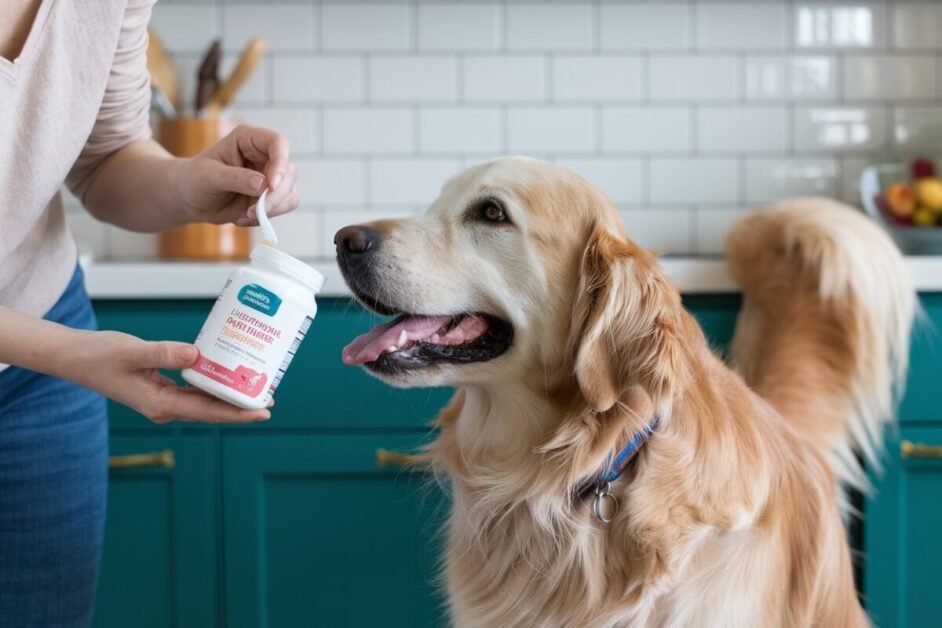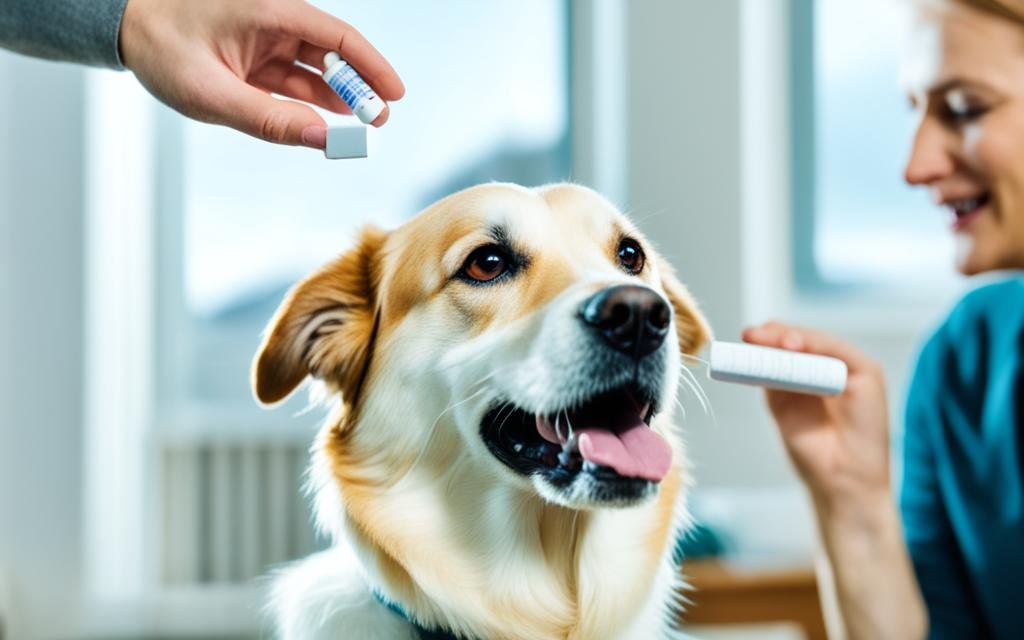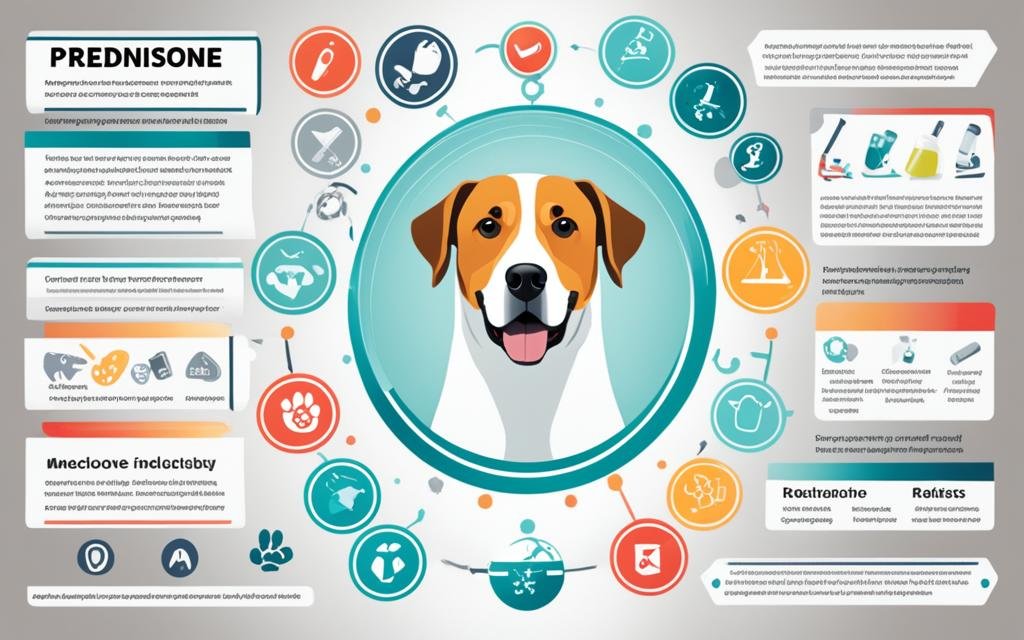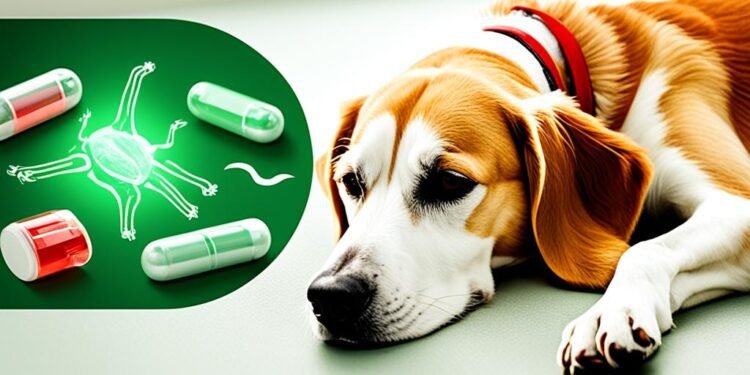Did you know about 80% of dogs on corticosteroids get prednisone? This fact highlights its key role in vet care. Prednisone is a common choice to help our furry friends. It has many benefits but also some risks. Knowing about prednisone can help you make the best choices for your dog’s health.
Key Takeaways
- Prednisone is a top corticosteroid given to dogs.
- Knowing its benefits can improve your pet’s health.
- Be aware of the risks that come with prednisone.
- It’s important to give the correct dose to avoid side effects.
- Talking to a vet is key for prednisone’s safe use.
Table of Contents
What is Prednisone?
Prednisone is a type of medicine that works like a hormone our bodies make. It helps reduce swelling and fights off diseases. This makes it great for treating conditions in dogs that involve inflammation or the immune system. It’s important for dog owners to know how prednisone affects their pet’s health.
When a dog needs prednisone, the vet decides the right amount and form. It comes as pills, liquid, or injections. A vet’s guidance ensures it’s given correctly, making it safe and effective for the dog.
| Form of Prednisone | Administration Method | Common Use Cases |
|---|---|---|
| Tablets | Oral | Chronic inflammation |
| Oral Liquid | Oral | Allergic reactions |
| Injectable Solutions | Subcutaneous | Severe inflammatory conditions |
How Does Prednisone Work in Dogs?
Prednisone plays a key role in how your dog’s body handles illness. It connects to specific receptors inside their cells. This action is crucial for reducing swelling and calming the immune system. Prednisone is powerful in fighting many inflammatory conditions.
The drug transforms into prednisolone in the liver, an essential step. As prednisolone, it works even better to lessen swelling and redness.
Knowing how prednisone helps can ease the worries of pet owners. It tackles the symptoms that cause your dog discomfort. This understanding highlights its value in keeping pets healthy.
| Aspect | Explanation |
|---|---|
| Binding Mechanism | Prednisone binds to glucocorticoid receptors in cells. |
| Inflammation Reduction | It decreases swelling and redness, alleviating discomfort. |
| Active Form | Converted to prednisolone in the liver for therapeutic effect. |
| Immune Response | Suppresss the immune system’s reaction against inflammation. |
Benefits of Prednisone for Dogs
Prednisone is a medication with large health perks for dogs, especially when fighting serious conditions. It has a strong anti-inflammatory effect, easing pain and swelling from things like allergies or autoimmune robotics.
It also calms itching in dogs.
- Alleviates inflammation: Prednisone reduces swelling and discomfort in dogs with arthritis or skin allergies.
- Manages chronic conditions: It’s key in treating serious issues like spinal injuries and autoimmune diseases.
- Supports endocrine function: For Addison’s disease, it’s critical in hormone regulation.
- Enhances cancer therapies: It boosts the success rate of cancer treatment plans.
The wide range of prednisone benefits make it a go-to drug for vets treating dogs with complex health challenges. But, it’s important for a vet to keep a close eye and adjust doses to avoid side effects.
Common Uses of Prednisone for Dogs
Veterinarians often use prednisone because it can treat many problems. Prednisone uses in dogs include treating various conditions, making it very useful. It’s commonly used for prednisone for allergies. Allergies can be to fleas, food, or things in the environment. Prednisone reduces the immune system’s reactions. This helps lessen itching and swelling.
Prednisone is also key for treating autoimmune diseases like immune-mediated hemolytic anemia. These diseases make the immune system attack the dog’s body by mistake. By calming the immune system, prednisone aids in healing and stabilizing the dog’s health.
Besides, prednisone is great for endocrine disorders such as Addison’s disease. This disease happens when not enough hormones are made. It also helps dogs with certain cancers, like lymphoma, feel better and live longer. This makes prednisone very important for treating a range of health problems in dogs.
Prednisone is crucial for helping dogs face many health challenges. It plays a big part in improving their well-being.
| Condition | Medication Purpose |
|---|---|
| Allergies | Reduces inflammation and itching |
| Autoimmune Diseases | Suppresses overactive immune response |
| Addison’s Disease | Replaces insufficient hormone production |
| Cancer (e.g., Lymphoma) | Alleviates symptoms, improves quality of life |
Prednisone Dosage for Dogs

Finding the right prednisone dosage for dogs needs us to look at many things. These include how much the dog weighs, how old it is, its health, and what sickness it has. It’s very important to have a vet come up with the dose plan. They’ll make sure it works well but is also safe.
Factors Influencing Dosage
When figuring out the prednisone dosage for dogs, we consider several important things:
- Weight: Bigger dogs often need more of the medicine.
- Age: Older dogs may need different amounts because of how they handle the medicine.
- Overall Health: If a dog already has health issues, it might affect how they react to prednisone.
- Specific Condition: How bad and what kind of illness also plays a role in setting the dose.
General Dosage Guidelines
The usual prednisone dosage for dogs ranges from 0.5 mg/kg to 2 mg/kg. It depends on whether it’s for reducing swelling or for immune suppression. Most times, we start with a high dose and then lower it. Watching your dog closely is key. Always talk to your vet about how your dog is doing or if you see side effects.
| Weight (lbs) | Dosage (mg) |
|---|---|
| 5 to 20 | 1.25 to 5 |
| 20 to 40 | 5 to 10 |
| 40 to 80 | 10 to 20 |
| 80 to 160 | 20 to 40 |
Administering Prednisone to Dogs
Giving dogs prednisone the right way is very important for it to work well. This medicine comes in different forms, each with its own benefits. Knowing how to give this drug, and what to do if you miss a dose, is key for pet owners.
Forms of Administration
Veterinarians often suggest various methods to give prednisone. These methods include:
- Oral Tablets: This is the go-to method. You can give it by itself or hide it in food.
- Liquid Form: Great for dogs that struggle with pills.
- Injectable Solutions: Vets use this when dogs need help fast.
It’s smart to give prednisone with food. This can help avoid stomach issues.
Missed Dose Guidelines
If you forget to give a dose of prednisone, here’s what to do:
- Give the forgotten dose as soon as you remember.
- If it’s nearly time for the next dose, just skip the missed one. Stick to the regular schedule.
- Don’t double up doses. It could be risky.

Potential Side Effects of Prednisone in Dogs
Understanding the side effects of prednisone in dogs is key. This medicine helps with many conditions but has risks. Pet owners should know these risks to keep their pets safe.
Common Side Effects
Many dogs on prednisone face common side effects. These can range in how severe and long they last:
- Increased thirst
- Heightened urination
- Increased appetite
- Restlessness
- Panting
- Lethargy
Serious Risks
Using prednisone for a long time can cause serious issues, like Cushing’s disease. Some risks are:
- Thinning skin
- Muscle weakness
- Gastrointestinal ulcers – which are dangerous if not treated quickly
Talk regularly with your vet if your dog is on prednisone. They can adjust the treatment as needed. This helps keep an eye on your dog’s health.
Monitoring Your Dog While on Prednisone
When you give your dog prednisone, it’s vital to watch them closely. Close monitoring helps check if the treatment works and catches side effects early. Regular vet visits are key. At these visits, the vet checks your dog’s weight, how much they eat, and overall health. This makes sure your dog is reacting well to the medicine.
Keep an eye out for unusual behavior or signs of being unwell. Actions like stomach upset or acting differently may mean your dog needs to see the vet right away. The role of veterinary oversight is very important. A good plan for checking on your dog’s health can lead to quick changes in their treatment. This keeps your dog healthy and safe.
Watching your dog closely while they take prednisone means you need to be really focused. Writing down everything about your dog’s daily life can help a lot. Note their activity, eating patterns, and any new behaviors. This diary helps the vet make the best choices for your dog. It also helps make sure your dog stays happy and healthy on this medicine.
Comparative Analysis: Prednisone vs. Other Medications
When we look at prednisone and other drugs for treating similar dog conditions, we see key differences. Prednisone is a strong steroid used for its ability to reduce swelling and suppress the immune system. Meanwhile, drugs like NSAIDs—carprofen or meloxicam—are other choices that help with inflammation.
Thinking about how well they work and their side effects is important. Prednisone can quickly ease acute conditions but might lead to issues like stomach ulcers and gaining weight if used for a long time. NSAIDs are generally gentler on the stomach but using them with steroids could be risky. This makes choosing between prednisone and other drugs complex.
The following table summarizes key factors for prednisone compared to NSAIDs:
| Medication | Efficacy | Common Side Effects | Cost |
|---|---|---|---|
| Prednisone | High for inflammatory and immune conditions | Weight gain, increased thirst, and urination | Moderate |
| Carprofen | Effective for pain and inflammation | Potential for gastrointestinal upset | Low to moderate |
| Meloxicam | Good for pain relief | Gastrointestinal issues, liver function effects | Moderate |
Vets think about what the dog needs, how urgent the problem is, and its health history. Knowing this helps us make good choices about treatments. This shows why talking about prednisone versus other drugs is key in animal care.

Specific Conditions Treated with Prednisone for Dogs
Pet doctors often use prednisone to treat many dog health problems. It shows how effective and adaptable prednisone is. Knowing about it helps pet owners understand when it might be right for their dogs.
Prednisone for Dogs with Allergies
Dogs with allergies can feel really uncomfortable. They might itch, get red spots, and swell up. Prednisone helps by reducing these symptoms. It works by calming the overactive immune system, making pets feel better.
Prednisone for Dogs with Cancer
Prednisone is also used when dogs have cancer. It’s part of the bigger treatment plan, especially for lymphoma. The drug reduces inflammation and eases side effects from cancer treatments. This makes the process easier for dogs.
Prednisone for Dogs with Autoimmune Diseases
With autoimmune diseases, a dog’s body attacks itself. This leads to serious health problems. Prednisone is crucial here as it dials down the immune system’s attack. This treatment brings back balance and reduces symptoms of autoimmune diseases.
Any Precautions to Take with Prednisone?
When giving prednisone to dogs, it’s important to be careful. You must make sure your pet stays safe while on this drug. It’s especially crucial not to give it to pregnant or nursing dogs. This is because it can harm the developing puppies.
Also, watch out for how it mixes with other medicines. Prednisone and some drugs, like nonsteroidal anti-inflammatory drugs (NSAIDs), shouldn’t mix. This is because they can greatly increase the chance of ulcers. Always follow your vet’s advice closely when using prednisone. Talking to your vet can help keep your pet safe from possible harm.
| Precaution | Explanation |
|---|---|
| Pregnant or Lactating Dogs | Risk of adverse effects on developing puppies. |
| Interactions with NSAIDs | Increased risk of ulcers when combined with certain drugs. |
| Veterinary Consultation | Essential for safe medication handling and minimizing risks. |
When to Consult Your Veterinarian
Always keep an eye on your dog’s health, particularly when they’re on prednisone. If they show symptoms like excessive thirst, more peeing, or tiredness, don’t wait. Seek a vet’s help right away. These signs could mean the medication isn’t right for them.
It’s crucial to have regular check-ups for dogs on prednisone. This lets the vet check if the treatment is working and adjust it as needed. Know when to see a vet. This is vital if your pet acts differently or seems in pain.
Here are reasons to get in touch with your vet:
- Unusual appetite or weight changes
- Too much panting or can’t settle
- Throwing up a lot or diarrhea that won’t stop
- Signs of infection like fever or odd discharge
- Acting more tired or not playing as usual
| Symptom | Action |
|---|---|
| Excessive thirst | Consult veterinarian for evaluation. |
| Lethargy | When to see a vet for guidance on treatment. |
| Vomiting | Contact vet immediately to assess the situation. |
| Weight changes | Schedule a check-up to discuss concerns. |
Stay aware of any health changes in your dog and know when to see a vet. Timely care means your dog can get better faster. Always work closely with your vet to keep your dog happy and healthy.
Cost Considerations When Using Prednisone for Dogs
Thinking about cost of prednisone for dogs is key for pet owners planning their dog’s treatment. Prices range from $7 to $15 for a month’s supply. This depends on the dose and type needed. Compared to other treatments, prednisone is quite affordable. Yet, looking at medication costs means considering more than just the pill price.
Extra costs can include:
- Veterinary consultations for administering the medication.
- Monitoring tests to see how your dog is doing with the treatment.
- Treatments for any side effects from using prednisone.
Knowing all the costs is vital for being a responsible pet owner. It helps make sure your dog gets what it needs without surprise expenses.
| Expense Type | Description | Estimated825.00 Cost |
|---|---|---|
| Prednisone Medication | 30-day supply depending on dosage | $7 – $15 |
| Veterinary Visits | Consultation and prescription | $50 – $100 |
| Monitoring Tests | Blood tests and health assessments | $75 – $200 |
| Treatment for Side Effects | Additional medications or therapies | Varies by condition |
Conclusion
Prednisone offers significant benefits for dogs facing health issues. It works well for inflammatory and autoimmune conditions. Yet, it also comes with risks that can’t be ignored.
Careful use and monitoring of prednisone can reduce side effects and improve health outcomes. Each dog reacts differently, so their treatment needs to be personalized. Always talk with a vet to figure out the best approach.
To sum up, prednisone can be very helpful for treating dog ailments, but it requires careful handling. The health and happiness of your dog should always come first.























